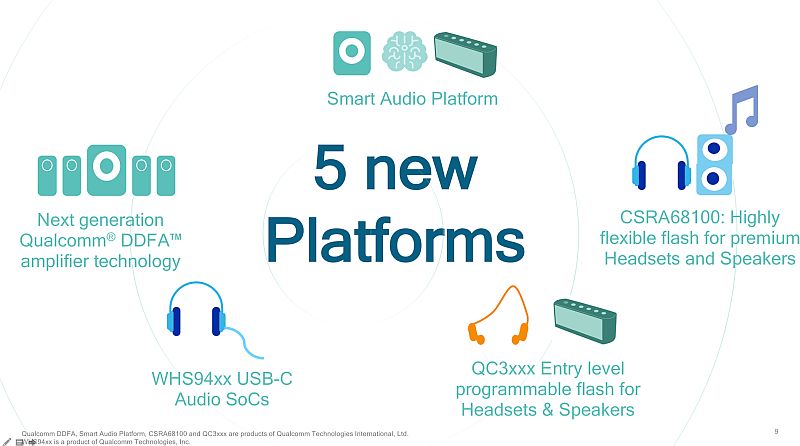Qualcomm Launches Smart Audio Platform that Makes Developing Smart Speakers Easier
The chipmaker introduced the new audio platform at its Voice and Music Developers conference in Shenzhen, alongside the all-new Qualcomm DDFA audio amplifier technology and new USB Type-C audio SoCs. Qualcomm
at the conference also talked about few of the trends in audio industry
including streaming of music, removal of headphone jack, and emergence
of smart assistants and speakers.
Under the company's new Qualcomm smart audio platform,
it will be offering the APQ8009 and APQ8017 chips; these SoCs will come
with a range of software configurations designed to allow OEMs to
create smart speakers across various product tiers and categories. The
Qualcomm smart audio platform is planned to be available Q3 2017, though
the company says that the timelinecan change. These new Qualcomm SoCs
support capabilities like advanced far-field voice capture, wake-word
detection, AllPlay multi-room audio streaming technology, and support
for major voice ecosystems in a single solution.
The far-field
voice capture will allow the smart speaker to pick up the user's voice
even from afar, while the wake-word detection will enable to wake up
from sleep when the hotword, for example "Hello Google," is said aloud
by the user. Qualcomm's AllPlay multi-room audio streaming technology
will allow users to configure multiple speakers to play the same or
different songs in each room of the home from streaming services, local
playlists on their devices, or DLNA media servers; moreover, the open
nature of the AllPlay ecosystem will enable users to link together
speakers from different brands, such as Panasonic, Hitachi, House of
Marley, Magnat etc, in their home using this platform.
The
Qualcomm APQ8009 and APQ8017 chips also beamforming and echo
cancellation; barge-in and voice capture in noisy environments; software
supporting virtual assistants, and support for hands-free voice calls
over both VoIP and HFP. Qualcomm has confirmed that the new smart audio
platform will receive support for Amazon Alexa Voice Service and Google
Assistant later this year, as well as Android Things and Google Cast for
Audio.
Qualcomm's
Anthony Murray, Senior Vice President and General Manager, Voice and
Music, said, "This platform is ideal for traditional speaker
manufacturers wanting to make the move to a connected platform as it is
designed to bring together all the necessary hardware, software and
tools needed to reduce development time. It also offers a great degree
of flexibility for those manufacturers who want to push the boundaries
when it comes to possible future applications for smart speakers."
Additionally, the company at the event announced a new addition to its audio system-on-chip (SoCs) platform,
namely CSRA68100, which is designed for premium wireless speakers and
headphones. The company says it is "designed to provide OEMs with
significantly more programming resources and freedom to develop use
cases with unique and differentiating features." A highly integrated
platform, it also supports several connectivity, system processing,
audio processing and power management resources.
Qualcomm also
announced QCC3XXX series of entry-level, flash-programmable audio
chipsets. These are aimed at developing entry-level products at
competitive price points for Bluetooth headsets and speakers. There's
also the new WHS9420 and WHS9410 single chip USB audio SoC platforms,
designed specifically for USB-C connected audio devices. With smartphone
brands doing away with the 3.5mm headphone jack, this platform is aimed
at users who want to continue to use wired headsets and speakers on
their phones by means of transfer of audio via the USB Type-C port.
At
the event, Qualcomm also revealed its next generation Qualcomm DDFA
audio amplifier technology for audio devices like wireless speakers,
soundbars, networked audio, and headphone amplifiers. The
next-generation DDFA tech will be available on Qualcomm's CSRA6620 SoC,
and will include a DDFA controller with eight channel inputs, two
channel outputs, microcontroller and configurable audio processor.
Qualcomm says the chip will "help OEMs to integrate best-in-class
amplifier performance in a lower complexity, more cost effective way
than was previously possible."

Comments
Post a Comment